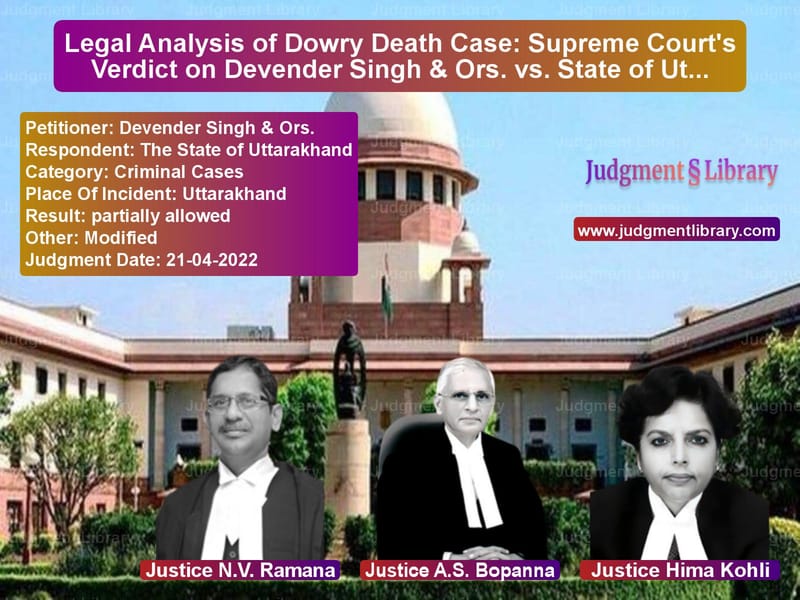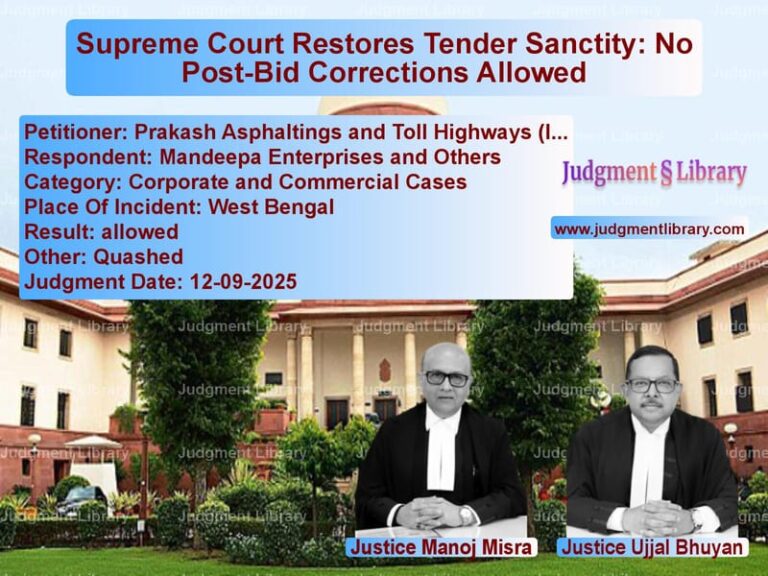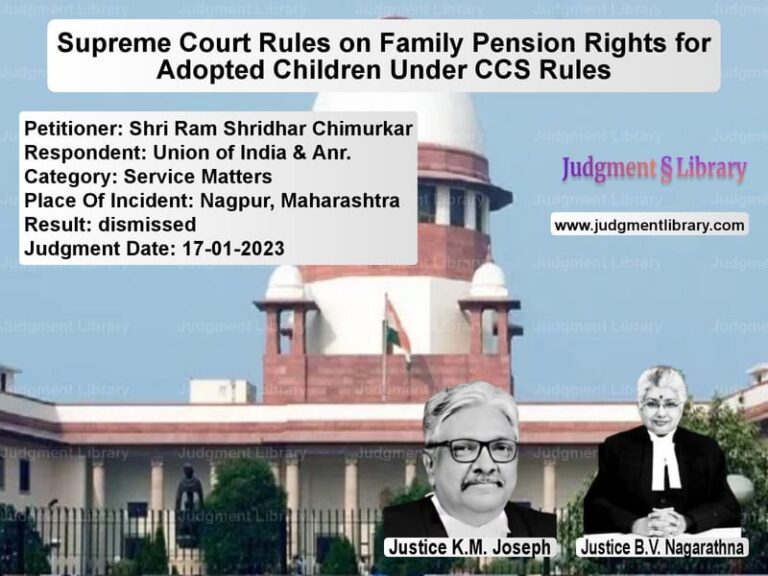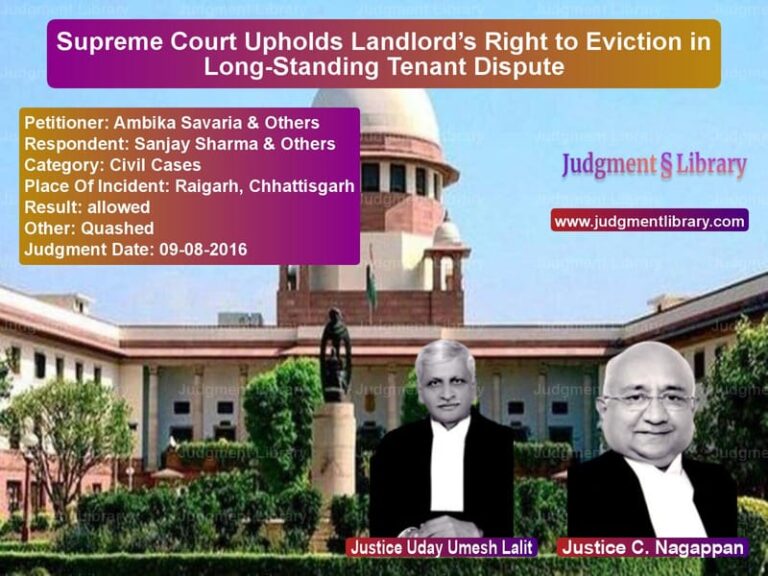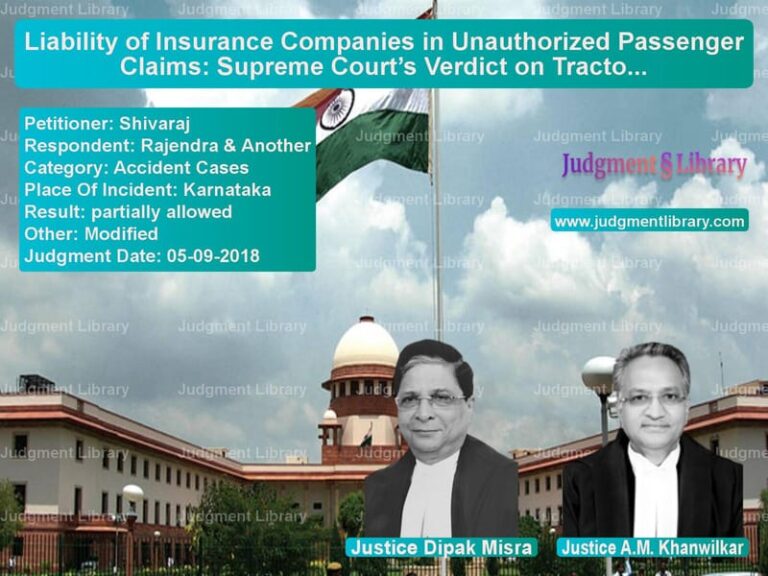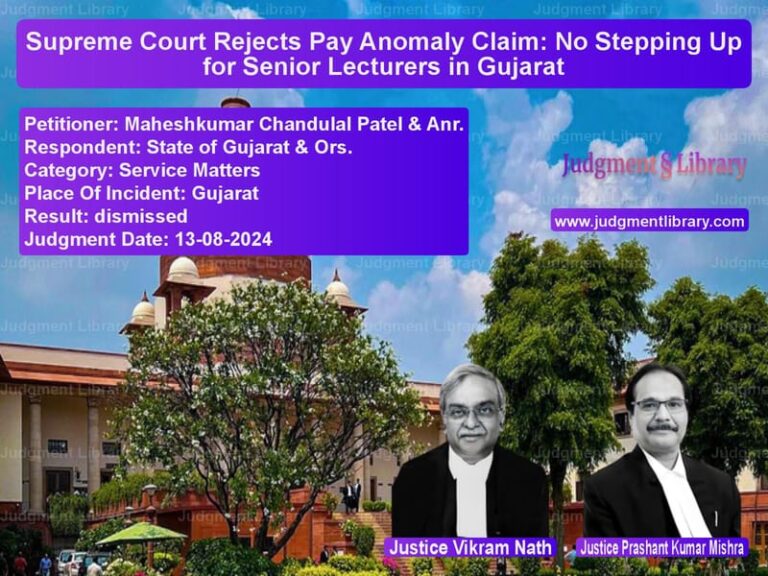Legal Analysis of Dowry Death Case: Supreme Court’s Verdict on Devender Singh & Ors. vs. State of Uttarakhand
The Supreme Court of India delivered a significant judgment in the case of Devender Singh & Ors. vs. State of Uttarakhand, addressing the complex issues of dowry death, cruelty under Section 498A IPC, and the evidentiary burden under Section 304B IPC. This case is pivotal in reinforcing legal principles related to dowry harassment and its severe consequences.
Case Background
The case involved the tragic demise of Sushila, who was married to Devender Singh for six months before she was found dead under suspicious circumstances. Her family alleged that she was subjected to continuous dowry harassment, which ultimately led to her unnatural death.
The prosecution accused Sushila’s husband (Devender Singh), her brother-in-law (Jagdish Singh), and her mother-in-law (Kunja Devi) of persistently demanding dowry and mistreating her, leading to her untimely demise. The trial court initially acquitted all the accused due to insufficient evidence, but the High Court reversed this decision, convicting them under Sections 304B, 498A, and 120B IPC.
Key Legal Issues
- Did Sushila’s death meet the criteria of dowry death under Section 304B IPC?
- Was the prosecution able to establish the essential ingredients of cruelty under Section 498A IPC?
- Did the High Court err in reversing the acquittal of the accused?
- Did the Supreme Court find sufficient evidence to uphold the conviction?
Arguments by the Petitioners (Accused)
The defense raised several arguments to challenge their conviction:
- There was no direct evidence proving that Sushila was subjected to dowry-related cruelty.
- The trial court’s acquittal was based on sound reasoning, and the High Court’s reversal was erroneous.
- The statements of the prosecution witnesses were contradictory and unreliable.
- The medical reports did not conclusively establish whether Sushila’s death was homicidal, suicidal, or accidental.
Arguments by the Respondents (Prosecution)
The prosecution countered these arguments with substantial evidence:
- Multiple witnesses, including Sushila’s mother and brother, testified about the frequent dowry demands and cruelty.
- The deceased had confided in her family members about her ill-treatment.
- The unnatural circumstances of her death, within six months of marriage, created a strong presumption of dowry death under Section 304B IPC.
Supreme Court’s Observations
The Supreme Court analyzed the case based on the following key legal principles:
1. Dowry Death Presumption under Section 304B IPC
The Court reiterated the presumption under Section 304B IPC, which states that if a woman dies under unnatural circumstances within seven years of marriage, and there is evidence of cruelty related to dowry demands, the burden shifts to the accused to prove their innocence.
Read also: https://judgmentlibrary.com/supreme-court-commutes-death-sentence-in-child-rape-and-murder-case-3/
The Court emphasized:
“In cases of dowry death, once the prosecution establishes the basic ingredients, the presumption of guilt under Section 113B of the Indian Evidence Act operates against the accused.”
2. Evidentiary Burden in Criminal Cases
The Court noted that while direct evidence of harassment is often difficult to produce, circumstantial evidence and witness testimonies play a crucial role. The Court held:
“The evidence of family members, when consistent and credible, cannot be discarded merely because they are interested witnesses.”
3. Cruelty under Section 498A IPC
The Court examined whether the accused were guilty of subjecting the deceased to cruelty. It held:
“Harassment for dowry, whether physical or mental, constitutes cruelty under Section 498A IPC.”
4. High Court’s Reversal of Acquittal
The Supreme Court examined whether the High Court was justified in overturning the trial court’s acquittal. It ruled:
“Reversal of acquittal must be based on compelling reasons. If the prosecution evidence is strong enough to raise a presumption of dowry death, interference is warranted.”
Final Verdict
- Conviction of the husband (Devender Singh) under Sections 304B and 498A IPC was upheld.
- The brother-in-law and mother-in-law were given the benefit of doubt and acquitted.
- The sentence of seven years of rigorous imprisonment for the husband was confirmed.
Impact of the Judgment
- Reinforcing Women’s Rights: The judgment reaffirms the legal provisions protecting women from dowry harassment.
- Upholding Legal Presumptions: The Court’s ruling strengthens the presumption under Section 304B IPC, ensuring that accused parties bear the burden of proving their innocence in dowry-related deaths.
- Balancing Fair Trial Rights: By acquitting two of the accused, the Court ensured that convictions are based on strong evidence rather than mere assumptions.
Conclusion
The Supreme Court’s judgment in Devender Singh & Ors. vs. State of Uttarakhand is a landmark decision in cases involving dowry deaths. It clarifies the evidentiary burden under Section 304B IPC and emphasizes that courts must carefully evaluate circumstantial evidence while ensuring that justice prevails. The ruling sends a strong message against dowry harassment while safeguarding the rights of the accused against wrongful conviction.
Petitioner Name: Devender Singh & Ors..Respondent Name: The State of Uttarakhand.Judgment By: Justice N.V. Ramana, Justice A.S. Bopanna, Justice Hima Kohli.Place Of Incident: Uttarakhand.Judgment Date: 21-04-2022.
Don’t miss out on the full details! Download the complete judgment in PDF format below and gain valuable insights instantly!
Download Judgment: devender-singh-&-ors-vs-the-state-of-uttarak-supreme-court-of-india-judgment-dated-21-04-2022.pdf
Directly Download Judgment: Directly download this Judgment
See all petitions in Bail and Anticipatory Bail
See all petitions in Attempt to Murder Cases
See all petitions in Fraud and Forgery
See all petitions in Theft and Robbery Cases
See all petitions in Custodial Deaths and Police Misconduct
See all petitions in Judgment by N.V. Ramana
See all petitions in Judgment by A. S. Bopanna
See all petitions in Judgment by Hima Kohli
See all petitions in partially allowed
See all petitions in Modified
See all petitions in supreme court of India judgments April 2022
See all petitions in 2022 judgments
See all posts in Criminal Cases Category
See all allowed petitions in Criminal Cases Category
See all Dismissed petitions in Criminal Cases Category
See all partially allowed petitions in Criminal Cases Category

